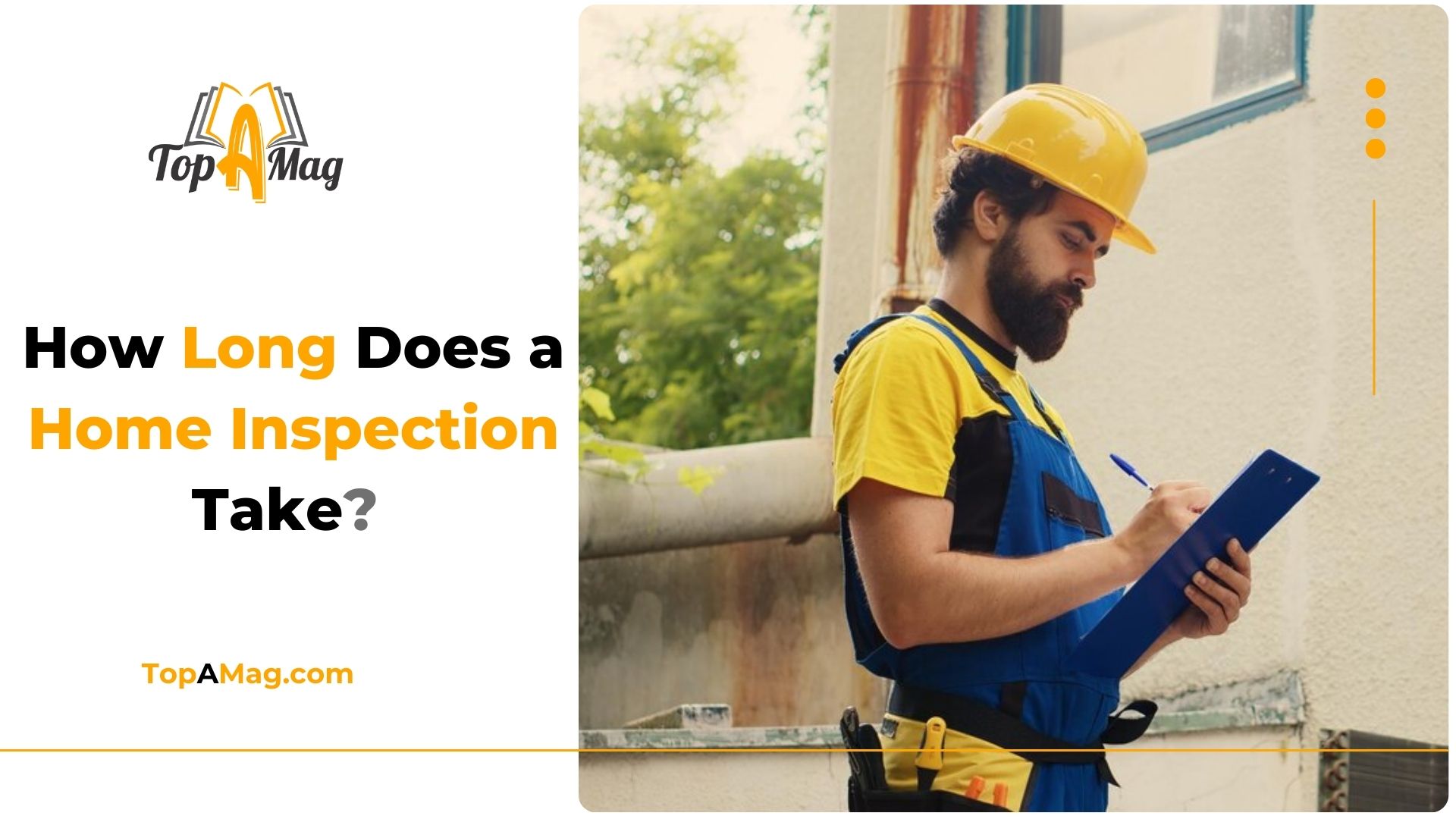When purchasing a domestic, one of the crucial steps is the home inspection. It’s a phase that can fill buyers with both excitement and anxiety. The time it takes to complete a home inspection can vary, influenced by numerous factors. Let’s delve deep into the process by The Top A Mag Team to understand what affects the duration and why it’s essential.
Key Takeaways
- Home inspection duration varies based on the property’s size, age, condition, and the type of inspection required.
- Older homes and those in poor condition typically take longer to inspect due to the need for more detailed evaluation.
- The home inspection process includes an initial walkthrough, a detailed examination, documentation of findings, and preparation of a comprehensive report.
- Home inspections are crucial for uncovering hidden issues, providing negotiation leverage, and offering peace of mind to buyers.
- Advancements in technology like drones, infrared cameras, and moisture meters enhance the thoroughness and efficiency of home inspections.
- Common issues found during inspections include roof problems, electrical deficiencies, plumbing issues, foundation cracks, HVAC system issues, and pest infestations.
- Hiring a qualified inspector with proper certification, experience, and membership in professional associations ensures a reliable inspection.
- After the inspection, buyers should review the report, request necessary repairs, budget for future repairs, and plan for ongoing maintenance.
What is a Home Inspection?
A home inspection is a thorough examination of a property’s condition, typically performed by a certified inspector. The inspector evaluates the home’s structure, systems, and components, such as the roof, foundation, plumbing, electrical systems, and more. The goal is to identify any potential issues that might require attention before finalizing the purchase.
Factors Influencing the Duration of a Home Inspection
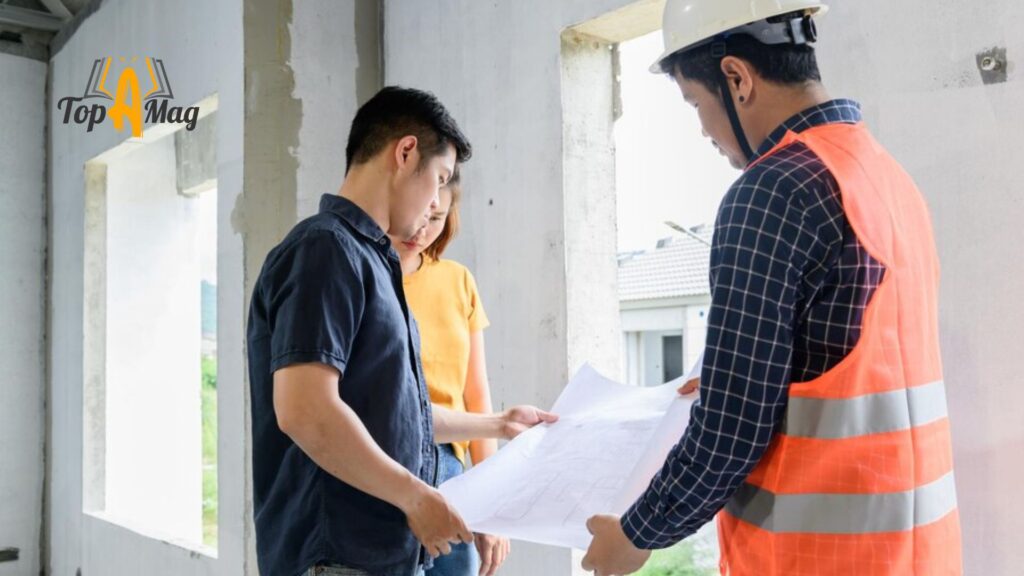
1. Size of the Property for Home Inspection
One of the most significant factors affecting the length of a home inspection is the size of the property. Naturally, a larger home with more square footage will take longer to inspect than a smaller one. For instance, a 1,000-square-foot house might take around 2-3 hours, while a 3,000-square-foot home could take 4-6 hours.
2. Age of the Home
Older homes often require more time to inspect. They might have outdated systems or components that need closer examination. Inspectors must be thorough when evaluating older properties, ensuring no detail is overlooked, which can extend the inspection duration.
3. Condition of the Property
A home in excellent condition might take less time to inspect than one that has visible issues or signs of neglect. If an inspector encounters problems like mold, structural damage, or pest infestations, they will spend additional time assessing the extent of these issues.
4. Type of Home Inspection
There are various types of home inspections, including standard home inspections, specialty inspections (such as mold or termite inspections), and comprehensive inspections that cover everything. Specialty inspections might require additional time and expertise, thereby lengthening the overall process.
5. Inspector’s Experience
An experienced inspector can often complete a thorough examination more quickly than someone who is less seasoned. Experienced inspectors know exactly what to look for and can identify issues faster, although they still ensure a meticulous evaluation.
The Home Inspection Process
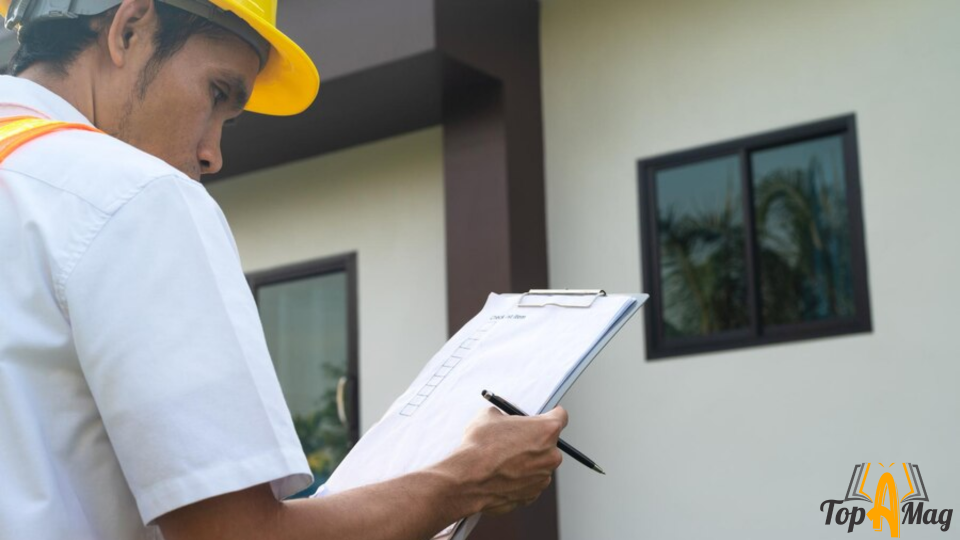
1. Initial Walkthrough
The inspection begins with an initial walkthrough. The inspector gets a general sense of the property’s layout and any obvious issues. This step usually takes about 30 minutes.
2. Detailed Examination
Following the walkthrough, the inspector conducts a detailed examination of the property. This includes checking the roof, foundation, walls, windows, doors, electrical systems, plumbing, HVAC systems, and more. Each component is carefully scrutinized, which can take several hours depending on the property’s size and condition.
3. Documenting Findings
During the inspection, the inspector will report their findings. This includes taking photographs, making notes, and sometimes even using specialized equipment to measure moisture levels or detect electrical issues. Documentation ensures that nothing is missed and provides a clear record for the homebuyer.
4. Preparing the Home Inspection Report
After the inspection, the inspector compiles all their findings into a detailed report. This report highlights any issues discovered during the inspection and may include recommendations for repairs or further evaluations by specialists. Preparing this report can take a few hours and is usually completed within 24-48 hours after the inspection.
Why Home Inspection is Essential?
1. Uncover Hidden Issues during Home Inspection
A home might look perfect on the surface, but a detailed inspection can uncover hidden issues that could cost thousands of dollars to repair. Identifying these problems before purchasing can save buyers from unexpected expenses.
2. Negotiation Leverage
If the inspection reveals significant issues, buyers can use this information to negotiate with the seller. They might request repairs, a price reduction, or even back out of the deal if the problems are too severe.
3. Peace of Mind
Knowing the true condition of a property provides peace of mind to buyers. They can proceed with the purchase, confident that they are making an informed decision and that there won’t be any unpleasant surprises after moving in.
Tips for Homebuyers During the Inspection

1. Be Present
While it’s now not obligatory, being present for the duration of the inspection may be beneficial. Buyers can ask questions, see issues firsthand, and better understand the property’s condition.
2. Read the Home Inspection Report Carefully
After receiving the inspection report, read it thoroughly. Make note of any issues highlighted and consider seeking additional evaluations for any areas of concern.
3. Don’t Rush the Process
Home inspections are a crucial part of the buying process. Don’t rush through it or push the inspector to hurry. A thorough inspection takes time but is worth the investment.
4. Follow Up on Recommendations
If the inspector recommends further evaluation by a specialist (like a structural engineer or pest control expert), take their advice seriously. Following up on these recommendations can prevent future problems.
The Role of Technology in Home Inspections
1. Drones for Roof Inspections
Drones have become a valuable tool in home inspections, especially for evaluating roofs. They provide a safe and efficient way to inspect hard-to-reach areas and can capture detailed images.
2. Infrared Cameras
Infrared cameras are used to detect issues not visible to the naked eye, such as moisture intrusion, insulation problems, and electrical hotspots. This technology adds another layer of thoroughness to the inspection process.
3. Moisture Meters
Moisture meters help inspectors identify areas with high moisture levels, which could indicate leaks or water damage. Detecting these issues early can prevent more extensive and costly repairs later.
4. Digital Reporting
Modern inspectors often use digital tools to compile their reports. These reports are detailed, easy to read, and can include photographs, videos, and even 3D models of the property. Digital reporting enhances the clarity and accessibility of the inspection findings.
Common Issues Found During Home Inspections
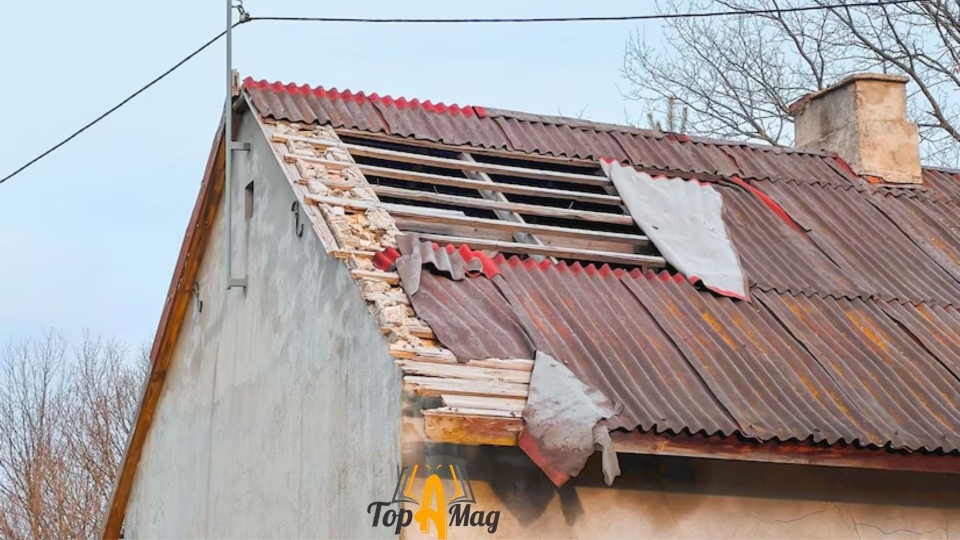
1. Roof Problems
Roof issues, such as missing shingles, leaks, or damaged flashing, are common findings. The roof is a critical component of a home, and its condition can significantly impact the property’s value and safety.
2. Electrical System Deficiencies
Outdated or faulty electrical systems pose a safety hazard. Inspectors frequently find issues like improper wiring, overloaded circuits, and non-compliant installations, which need to be addressed promptly.
3. Plumbing Problems during Home Inspection
Leaky pipes, slow drains, and outdated plumbing fixtures are common issues that can lead to water damage and increased utility bills. Inspectors carefully check for these problems to ensure the plumbing system is in good working order.
4. Foundation Cracks
Foundation issues, such as cracks or shifting, can indicate significant structural problems. These issues can be steeply priced to repair and can affect the steadiness and protection of the home.
5. HVAC System Issues
Heating, ventilation, and air conditioning (HVAC) systems are essential for preserving cushty dwelling surroundings. Common issues include inadequate maintenance, dirty filters, and malfunctioning components.
6. Pest Infestations
Termites, rodents, and different pests can cause tremendous damage to a domestic. Inspectors look for signs of infestations and recommend treatments if necessary.
The Importance of Hiring a Qualified Inspector for Home Inspection
1. Certification and Experience
A qualified home inspector should have proper certification and ample experience. Certification ensures that the inspector has undergone the necessary training and adheres to industry standards. Experience allows them to identify issues more accurately and provide reliable recommendations.
2. Detailed Reports
A good inspector will provide a detailed report that is easy to understand. This report should include photographs, descriptions of any issues found, and recommendations for repairs or further evaluations. Detailed reports help buyers make informed decisions about their purchase.
3. Ongoing Education
The best inspectors continually update their knowledge and skills through ongoing education. Building codes and standards evolve, and staying current ensures that inspectors can provide the most accurate and up-to-date information.
4. Professional Associations
Membership in professional associations, such as the American Society of Home Inspectors (ASHI) or the International Association of Certified Home Inspectors (InterNACHI), can be a good indicator of an inspector’s commitment to their profession. These associations often require members to adhere to a code of ethics and participate in continuing education.
What to Expect After Home Inspection?
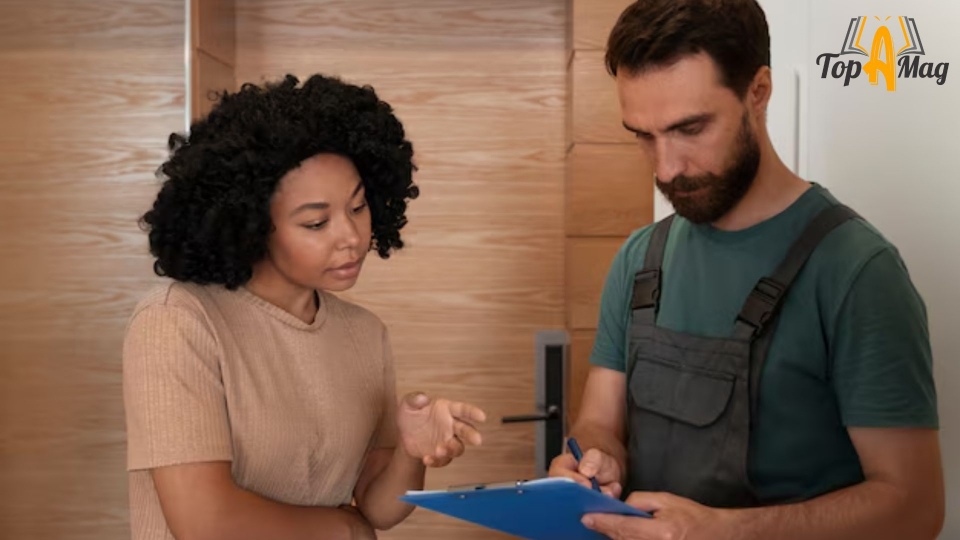
Reviewing the Report
After the inspection, buyers should carefully review the report. Take note of any major issues or areas of concern that were identified. This review is crucial for understanding the property’s condition and planning any necessary repairs or negotiations with the seller.
Requesting Repairs
Based on the inspection report, buyers may request that the seller make certain repairs before closing the deal. This negotiation can be a critical part of the buying process and can sometimes lead to a reduced purchase price if significant issues are found.
Budgeting for Repairs
Even if the seller agrees to make repairs, there might still be some issues that the buyer will need to address after moving in. It’s wise to budget for these repairs and plan accordingly. Knowing the potential costs upfront can help avoid financial surprises later.
Planning for Maintenance after Home Inspection
A home inspection can also provide valuable insights into the ongoing maintenance needs of the property. Understanding these needs helps buyers plan for routine maintenance and prevent future problems. Regular maintenance of things like kitchen Texture is essential for preserving the property’s value and ensuring a safe living environment.
Frequently Asked Questions (FAQs)
How long does a standard Home Inspection take?
A standard home inspection usually takes between 2 to four hours, depending on the size and circumstance of the assets. Larger or older homes might require additional time.
Can I be present during the Home Inspection?
Yes, it is quite advocated for buyers to be gifts for the duration of the house inspection. Being there allows you to ask questions, see issues firsthand, and gain a better understanding of the property’s condition.
What happens if significant issues are found during the inspection?
If significant issues are found, buyers can use the inspection report to negotiate with the seller. This might involve requesting repairs, asking for a price reduction, or even opting out of the purchase if the issues are too severe.
Do I need additional inspections besides the standard Home Inspection?
In some cases, additional inspections might be necessary, especially if the standard inspection reveals potential issues. Specialty inspections, such as mold, termite, or structural inspections, provide a more detailed assessment of specific concerns.
How soon will I receive the Home Inspection report?
Most home inspectors provide the inspection report within 24-48 hours after completing the inspection. This report includes detailed findings, photographs, and recommendations for any necessary repairs or further evaluations.
Conclusion
A home inspection is a critical step in the home-buying process. It provides a detailed assessment of the property’s condition, uncovering hidden issues that could impact the buyer’s decision. The duration of a home inspection can vary based on factors like the size, age, and condition of the property, but it’s essential not to rush this process. By understanding what a home inspection entails and why it’s crucial, buyers can approach their purchase with confidence, ensuring their new home is a sound investment.

